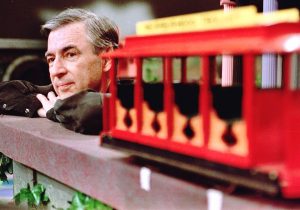About 30 years ago, a friend of ours was in the throes of a major depression. As she lay listlessly on the couch one day, feeling the weight of the world on her shoulders, she flipped through the television channels and came across the classic children’s television program Mister Rogers’ Neighborhood. Struck by the show’s gentle, loving host Fred Rogers, our friend penned a letter to him, expressing her grief and hopelessness, but also her appreciation for briefly lifting her spirits with his message of love and hope. A week later, to her great surprise, she received a hand-written letter back from Rogers, who thanked her for writing and gave her encouragement and support. To this day this framed letter from Rogers hangs on the wall of our friend’s home, and she remains deeply grateful to him for reaching out to her during the most difficult time in her life.
Not surprisingly, Fred Rogers wrote many such letters to his fans. In an age when celebrity misbehavior and drug use capture most of the headlines, Rogers was a true gentleman whose primary mission in life was to enrich the lives of other people, especially children. As a young man, Rogers noticed during television’s infancy how the new medium was being misused. “I went into television because I hated it so,” said Rogers. “I thought there was some way of using this fabulous instrument to be of nurture to those who would watch and listen.”
Rogers developed a show in 1968 that helped children build self-esteem, conquer their fears, and love others. Mister Rogers’ Neighborhood encouraged children to become happy and productive citizens. It was the longest-running program on public television, lasting 33 years and finally ending its run in 2001. Rogers was an American icon of children’s education and a symbol of compassion and morality. He became such a beloved figure that one day, when the media reported that his car had been stolen, the thieves immediately returned the car to the exact spot from which it was taken, with an apology on the dashboard. It read, “If we’d known it was yours, we never would have taken it.”
While accepting a Lifetime Achievement Award at the 1997 Emmy Awards Show, Rogers approached the microphone and said, “All of us have special ones who have loved us into being. Would you just take, along with me, ten seconds to  think of the people who have helped you become who you are. Ten seconds of silence.” Tears began to flow from the eyes of many in the audience. Rogers finally looked up from his watch and softly said, “Whomever you are thinking about, how pleased they must be to know the difference you feel they’ve made.” Actor LeVar Burton recalls a time when Rogers was invited to a gathering at the White House, and he asked everybody, including President Clinton, to close their eyes for 60 seconds and think about someone who had helped shape them. Again people wept. “Fred felt it was critical to acknowledge those who have helped us come into being,” said Burton. “And Fred’s legacy is that he is that person for so many of us.”
think of the people who have helped you become who you are. Ten seconds of silence.” Tears began to flow from the eyes of many in the audience. Rogers finally looked up from his watch and softly said, “Whomever you are thinking about, how pleased they must be to know the difference you feel they’ve made.” Actor LeVar Burton recalls a time when Rogers was invited to a gathering at the White House, and he asked everybody, including President Clinton, to close their eyes for 60 seconds and think about someone who had helped shape them. Again people wept. “Fred felt it was critical to acknowledge those who have helped us come into being,” said Burton. “And Fred’s legacy is that he is that person for so many of us.”
Rogers was awarded the Presidential Medal of Freedom in 2002, and one year later, after Rogers passed away at the age of 74, the U.S. Senate approved a resolution to commemorate his life. It read, in part, “Through his spirituality and placid nature, Mr. Rogers was able to reach out to our nation’s children and encourage each of them to understand the important role they play in their communities and as part of their families. More importantly, he did not shy away from dealing with difficult issues of death and divorce but rather encouraged children to express their emotions in a healthy, constructive manner, often providing a simple answer to life’s hardships.”
To the very end of his life, Rogers encouraged people to love one another and to appreciate the deep connections all humans have with each other. Shortly before he died, while giving a commencement speech at Dartmouth College in 2002, he said, “Our world hangs like a magnificent jewel in the vastness of space. Every one of us is a part of that jewel, a facet of that jewel. And in the perspective of infinity, our differences are infinitesimal. We are intimately related.”
In 2018, a documentary entitled Won’t You Be My Neighbor? based on the life and legacy of Rogers, was released to critical acclaim and became the highest grossing biodoc film of all time. Now Tom Hanks stars as Fred Rogers in the highly acclaimed film, A Beautiful Day in the Neighborhood. We are grateful that the world is acknowledging the heroism of such kind, gentle man who has helped so many millions of people become their best selves.
– – – – – – – – – – – –



